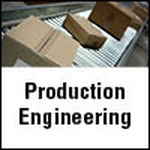
Precision Manufacturing Course Details - Fees, Subjects, Syllabus, Duration, Eligibility, Career Scope
Degrees offered: Diploma, B.E /B.Tech
What is Precision Manufacturing
The manufacturing industry is the key component of combining all the industries across the globe. Manufacturing of any type of product needs precision, and the Precision Manufacturing course teaches all the aspects related to this field.
With an ever-increasing consumption of goods in all industries, the demand for manufacturing engineers is estimated to increase by 40% by the year 2025.
The course, precision manufacturing is designed to teach students about both traditional and modern manufacturing methods. But the course is relatively new in India and available in very few institutes and colleges related to government skills program initiation.
The course is multi-disciplinary and interlinked to all major manufacturing industries; thus, precision manufacturing course curriculum is designed to cover all the modern techniques present in the market and prepare students for future career prospects.
Eligibility Criteria (UG & PG) of Precision Manufacturing
Precision Manufacturing Eligibility criteria
The eligibility criteria for the Precision Manufacturing course differ from other related courses. As the course availability is less, the admission process varies greatly in different institutes. Some of the basic requirements to be eligible for the course are mentioned below –
For Undergraduate Precision Manufacturing Courses
Candidates must have a 10+2 education from a recognized board of education.
The total aggregate marks obtained in 10+2 should at least be 50%
Students might need to give a course suitability exam conducted by the institute along with a personal interview and group discussion.
For Postgraduate Courses and Diploma in Precision Manufacturing
Completion of 10+2 education is mandatory with a minimum aggregate of 50% marks from the recognized education board.
A Bachelor's degree is in any of the related fields from a recognized institute.
The marks obtained in Bachelor's degrees should cross a minimum of 50%.
Depending on the candidates may have to appear for university-level entrance exams and personal interviews.
Precision Manufacturing Entrance Exams
Since the program is still in its preliminary stages, there are no national-level examinations conducted for the admission process at the graduate level. Most institutes take personal interviews and course suitability tests at their level for the admission process.
But students wanting to pursue a postgraduate diploma course can attempt the following entrance exam for admission –
Graduate Aptitude Test in Engineering (GATE) – The exam is conducted in February at a national level for admission in various engineering courses across India. Students are required to have a Bachelor's degree in any engineering related field to be eligible for the exam.
College Predictors VIEW ALL
Scope of Precision Manufacturing in India and Abroad
The major part of the manufacturing industry is owned by private industries from automobile manufacturing to home appliances. Some of the government-based sectors such as railways, Indian Defence Forces, Aviation Medicine, and Information technology, provide surplus employment opportunities.
With the global companies making their headquarters in India, the scope of the Precision Manufacturing course has increased multiple folds. These companies often look for trained personnel with the required mindset to innovate the field of manufacturing.
The competition in the Precision Manufacturing industry in India is almost negligible due to a lack of skilled professionals. But under national-level policies such as Skill India Program, the government has taken the initiative to launch this course in several parts of the country.
As per the recruitment process, aspirants with proper degrees and experience can easily get jobs in the manufacturing industry as precision engineers, project managers, manufacturing engineers, and technicians. Aspirants wanting to work for a cause can also join various NGOs working nationally and internationally to design cost-efficient technologies for basic product manufacturing. Apart from a nicely paying job they can have the satisfaction of working for a better future.
Course Fees Precision Manufacturing
| Minimum Fees | Maximum Fees | |||
|---|---|---|---|---|
| Private | Government | Private | Government | |
| PG | ||||
| DIPLOMA | ||||
Course Subjects
Students pursuing the Precision Manufacturing course can opt for either a Bachelor's degree that is of 3-4 years duration depending on the institute and is divided into 6-8 semesters. Whereas, the post-graduation degree or diploma courses are a 2-year program segregated into 4 semesters.
The subjects taught in this time provide a crucial understanding of the Precision Manufacturing industry along with traditional and modern Precision Manufacturing techniques. Some of the major subjects in the Precision Manufacturing course are listed below –
Algebra and Trigonometry
Principles of CNC
Green Manufacturing Methods
Advanced MTP and Theory
Technical Drawings
English Core and Communications
Computer-Aided Manufacturing
Software Programming
Mould Manufacturing
Electrical Discharge Machinery
Statistical Process Controlling
Geometric Dimensioning and Tolerancing
Machining Fluids and Materials
Manufacturing Techniques
Careers in Precision Manufacturing
The manufacturing industry has always been an integral part of all industries irrespective of product production.
Directly contributing to the Indian economy, the government has realized its potential and has included Precision Manufacturing in the national skill program. Increasing consumerism demands a rise in the manufacturing of products.
This sector can provide a rewarding career to aspirants with proper qualification and the required skills. As the involvement of the government sector has increased, the availability of high-paying jobs with additional job security and other incentives has increased too.
It is one of the few courses where aspirants can easily initiate their carer in a completely new field regardless of job experience if they have the required advanced education in the field.
Upcoming trends
With the increase in product consumption, the manufacturing of new and innovative products requires cost-effective and sustainable machinery with feasible technologies and processes.
The Precision Manufacturing Industry is majorly funded by world-renowned companies in the research and development domain to boost their production by altering their marketing and production cost.
New techniques and processes are developed to fulfil these demands. Some of the cutting-edge technologies that have changed the look of this industry in today's time include –
Electrochemical Machining
Waterjet Cutting Technology
Remote Operational Solutions
Laser Beam Machining
Streamlined Machinery
Automated Finishing Systems
3D printing or Adaptive Manufacturing
Job Profiles and Top Recruiters
Job Profiles in Precision Manufacturing
Precision Manufacturing is a very vast field comprising more than a hundred sectors, students might face difficulties in choosing their career path but knowing about the types of job profiles and the actual work is done can help them in this decision making.
The Precision Manufacturing is new in India; the course availability is very low; nonetheless, the job opportunities are surplus.
With the decrease in resources increasing the cost of production, the companies need professionals with skills and knowledge to design cost-effective manufacturing processes which are also sustainable. The increasing rate of employment in this sector determines its scope. There is always a prominent demand for candidates with proper education and qualification.
As the competition factor within the industry is very low in India, aspirants have a better chance of earning a high package job or head positions within a short period.
The job profiles available cover major sectors such as nanotechnology, Computer-aided manufacturing, technical support, fieldwork, production machining, and software programming.
The job profiles offered in this field comes with a relatively high salary package, and candidates have the chance to acquire many field-related experiences. And the recruitment process is solely depending on a candidate's educational qualifications and skills present. Some of the most common job profiles in Precision Manufacturing are mentioned with their job description for reference purposes.
Job Profile | Job Description |
System Engineer | A System Engineer in Precision Manufacturing is responsible for designing, testing, and uploading of computer software regarding the machinery used. They also manage any issues related to operating systems in machinery |
CAM Engineer | A CAM Engineer interprets the machinery designs for selective purpose and provides the manual specification along with routing instructions for operating the machinery. They also focus on various CAM programs essential to their field. |
Production Engineer | A Production Engineer focuses on various production aspects required in the projects and maintains the productivity of junior recruits. They also supervise the quality and safety check of the products manufactured. |
Machinist | A Machinist gives mechanical support in the production operations. They are assigned to precisely repair the industrial machinery, both manual and automated equipment. They monitor product performance and effective production. |
Field Representative | They are the support providers to the sales team and responsible for creating promotion strategies for brand awareness. They also collect product feedback through direct interaction with customers. |
Manufacturing Quality Engineer | A Manufacturing Quality Engineer works in multiple sectors such as automobiles, industrial machinery, home appliances. They are required to supervise, test, and report the product quality for safety measures. They also handle the inspection of raw material and components required for production. |
Regional Manager | A Regional Manager's job revolves around understanding the demands of the assigned area and deriving marketing strategies accordingly. They contribute to major marketing decisions and analyse the product performance regularly. |
Top Recruiters in Precision Manufacturing
As the Precision Manufacturing field is linked to many other sectors, there are numerous sectors for the recruiting process. From government corporations to private industries, the demand for trained professionals is on the rise. These organizations conduct their recruitment process at a pretty regular rate.
Some of the famously private and public firms recruiting Precision Manufacturing engineers are –
Tata Group
Ashok Leyland
ISRO
BHEL (Bharat Heavy Electricals Limited)
National Hydroelectric Power Corporations (NHPC)
Hindustan Petroleum Corporation Limited (HPCL)
BOSCH India
Reliance Group
Volvo
Average Salary
The jobs and their average salary packages offered in the Precision Manufacturing sector are higher than any other manufacturing field. Students can easily start their careers and get hold of their investment made through education in the form of stable jobs.
A list in which the most preferred job profiles in the Precision Manufacturing given with their average annual income is mentioned below. The mentioned amount is an estimation and might differ in the actual salary package depending on factors like job experience, skills, university of graduation.
Job Profile | Annual Income |
System Engineer | Rs. 6-8 Lakhs p.a. (Approx.) |
CAM Engineer | Rs. 7-12 Lakhs p.a. (Approx.) |
Production Engineer | Rs. 5-7 Lakhs p.a. (Approx.) |
Machinist | Rs. 2-4 Lakhs p.a. (Approx.) |
Field Representative | Rs. 4-6 Lakhs p.a. (Approx.) |
Manufacturing Quality Engineer | Rs. 7.5-11 Lakhs p.a. (Approx.) |
Regional Manager | Rs. 8-10 Lakhs p.a. (Approx.) |
Required Skillset for Precision Manufacturing
The Precision Manufacturing industry requires candidates with skills and ability to be innovative and create the required product. Students must be aware of the skills essential in the field, apart from academic knowledge.
Some of the preferred qualities in the area of Precision Manufacturing are listed below along with their significance –
Field Understanding – To be able to fit in the criteria of any job profile, aspirants must be aware of the field and have an understanding of the work done in their respective sectors.
Technical Skills – Apart from bookish knowledge, it is crucial to acquire actual technical skills that can be useful in the field environment. Aspirants should be able aware of the techniques in the present market and increase their knowledge regarding the same.
Analytical Mindset – Having an analytical mindset is very helpful in Precision Manufacturing as candidates should be able to analyze the specific techniques and processes required to manufacture a particular product in a cost-effective manner.
Team Management – For the smooth functioning of all job profiles in the hierarchy of a company, candidates should be able to manage the team and increase the overall productivity in the given time frame.
Course Curriculum for Precision Manufacturing
The course curriculum of Precision Manufacturing is designed to provide practical and theoretical knowledge regarding all types of manufacturing techniques present in the market. The subjects introduced in the two years are enough to excel in the field of Precision Manufacturing.
The course is multidimensional covering sectors from home appliance manufacturing to Indian Defence forces.
Students get the opportunity to be a part of the world's largest and highest employment rate industries. The course specifics in India might differ in institutes, but some of the basic subjects covered include manufacturing processes, algebra, trigonometry, technical drawings, and advanced machine protocols, among others. The course imparts the required knowledge to change the course of Precision Manufacturing in India.
Frequently Asked Questions (FAQs)
Question: How important is Precision Manufacturing?
Answer :
The field of Precision Manufacturing is very important in the grand scheme of things as over the years progress has become more and more intricate requiring the manufacturing of goods precise to the millimetre or even smaller in certain cases, making this field extremely important.
Question: What are some of the most common specializations in Precision Manufacturing Course?
Answer :
The field of Precision Manufacturing is very diverse and combines numerous industries. Some of the most popular specializations in this field are -
Nanotechnology
Indian Defence Forces
Aerospace Engineering
Computer-Aided Manufacturing
Production Machining
Software Programming for Industrial machines
Question: What are the top colleges offering Precision Manufacturing Course?
Answer :
Due to the less popularity of the course in India, mostly government institutes enrolled in Skill India Program offer this course. The college list is given below –
Government Tool Room and Technology Centre, Mysore
Government Tool Room and Technology Centre, Karunadu
Question: What type of concepts and subjects are taught in Precision Manufacturing Course?
Answer :
The Precision Manufacturing Course mainly focuses on teaching traditional and modern manufacturing techniques along with the basic concepts of physics, chemistry, engineering, and mathematics. Some of the most important subjects and concepts taught in the program are –
Algebra and Trigonometry
Principles of CNC
Green Manufacturing Methods
Advanced MTP and Theory
Technical Drawings
English Core and Communications
Computer-Aided Manufacturing
Software Programming
Mould Manufacturing
Question: What subject background is necessary for admission in Precision Manufacturing course?
Answer :
As the Precision Manufacturing post-graduation diploma course is available in very few institutes in India, students with a 10+2 education in the subjects of physics, chemistry, and mathematics are preferred for the course, and having an engineering background in a Bachelor’s degree is highly sought after.


















